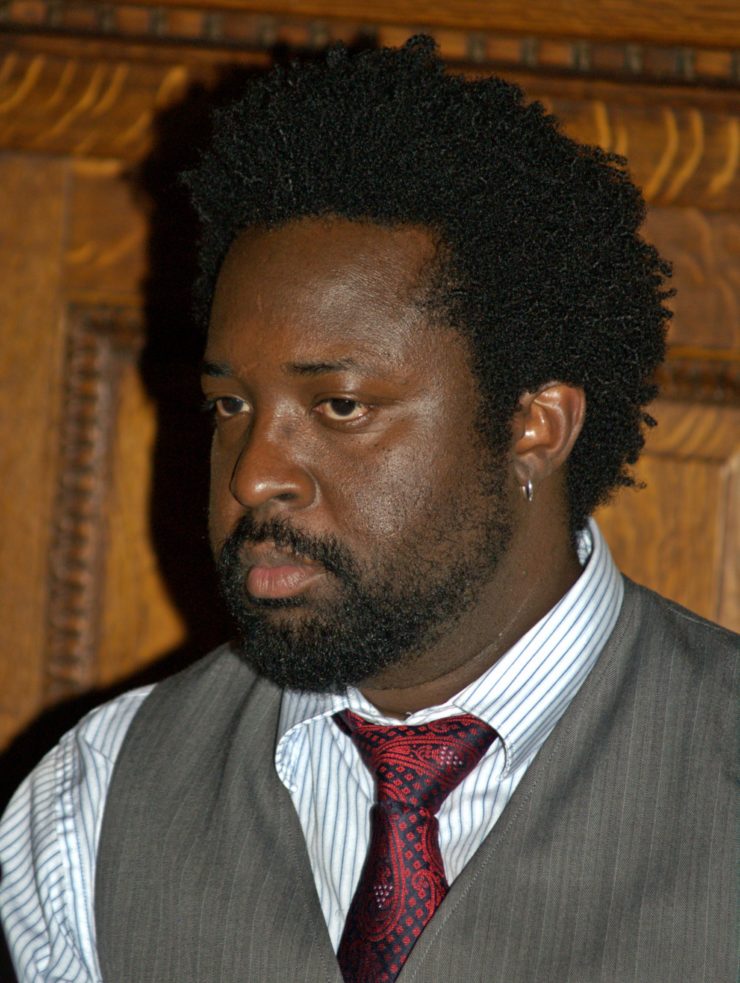Riverhead Books will publish an epic fantasy trilogy by Marlon James, winner of the Man Booker Prize for his novel A Brief History of Seven Killings. Over the course of three books (Black Leopard, Red Wolf; Moon Witch, Night Devil; and The Boy and the Dark Star), The Dark Star Trilogy will unravel the tale of eight mercenaries hired to locate a missing boy; nine years later, the boy is dead and only three mercenaries remain, locked in the dungeon of a dying king awaiting trial for the boy’s death. Each book will take on one perspective—the Tracker, the Moon Witch, and the Boy—and reveal, Rashomon-style, what the previous books got right and wrong about the story.
James has been researching and worldbuilding since he handed in the manuscript for A Brief History in 2014, he told Entertainment Weekly. The inspiration for the trilogy came from an argument with a friend about The Hobbit movie casting and diversity and inclusion in fantasy:
It made me realize that there was this huge universe of African history and mythology and crazy stories, these fantastic beasts and so on, that was just waiting there. And I’m a big sci-fi geek—I love my Lord of the Rings, I love my Angela Carter and my Dragonslayer. I think the argument ended with me saying, “You know what? Keep your d— Hobbit.”
And it made me start to think about the fantastic African epic traditions—some of the stories I grew up with, like Anansi the Spider. I just realized that there’s this huge pool of fantastic stories to draw from. It’s sort of like my being a scholar of African history and mythology, and my being a total sci-fi/fantasy geek who rereads things like The Mists of Avalon, they just sort of came together.
Drawing on this epic oral storytelling—some of which, like The Epic of Son-Jara and The Epic of Askia Mohammed, are as old as Beowulf—as well as studying African languages to create his own, James has been creating a fantasy world that he describes as “more Middle Earth than say, Mogadishu. It’s all these imagined spaces, and all these imagined worlds, but still playing on a lot of African culture. But also, sort of recapturing some of the glories of empires—a lot of which the British just kind of burnt to the ground, which is why we don’t talk about them now. Going way back, the touch point for this story would probably be just after the dawn of the Iron Age.” Or, put more pithily: “if Luke Cage was suddenly Conan the Barbarian.”
He also shared what to expect for Black Leopard, Red Wolf, which is expected to be published fall 2018:
The very, very basic plot is this slave trader hires a bunch of mercenaries to track down a kid who may have been kidnapped. But finding him takes nine years, and at the end of it, the kid is dead. And the whole novel is trying to figure out, “How did this happen?” So [Black Leopard, Red Wolf] itself is basically a witness testimony. The thing is, the next novel is somebody else’s eyewitness testimony, and their first remark is, “Everything you read before is not true.”











Sounds awesome!!!
Just a quick note to say that neither The Epic of Son-Jara nor The Epic of Askia Mohammed are as old as Beowulf. Both tell the tales of African leaders from the 1200s through the 1400s. Beowulf, on the other hand, as we know it was written down between 975 and 1025, and was likely composed at least a hundred years earlier.
To suggest that they are as old as Beowulf does both African compositions a great disservice, demonstrating that the author does not have any care for the context of the poems themselves or the culture represented within them. Only that they are old, and therefore beyond her ken.
That strikes me as being a very risky way to write a trilogy. I hope he knows what he is doing.
I heard him refer to these as “the African Game of Thrones” once, and it’s interesting that they’ve shifted to a more Lord of the Rings-inspired take. Considering how dark (and thoroughly excellent) his sort-of fantasy/magical realism novel The Book of Night Women is, doubly do.
I’d heard him talk about this in prior interviews, and I’m so glad he’s following through. Answers more than one need: bringing African mythos to the fantasy genre, and a real, true attempt at melding literary fiction and the fantasy genre. We need this model, now.